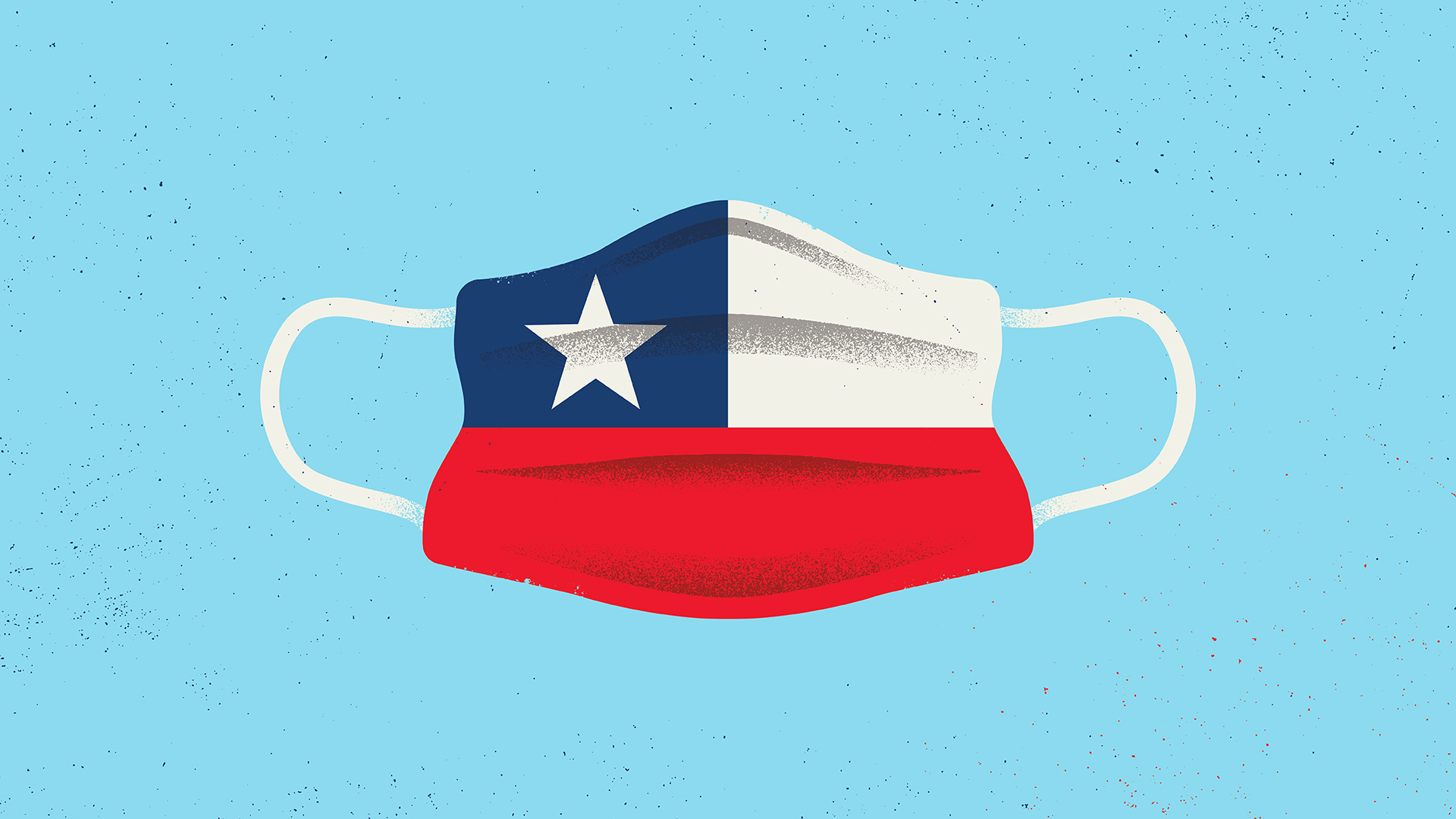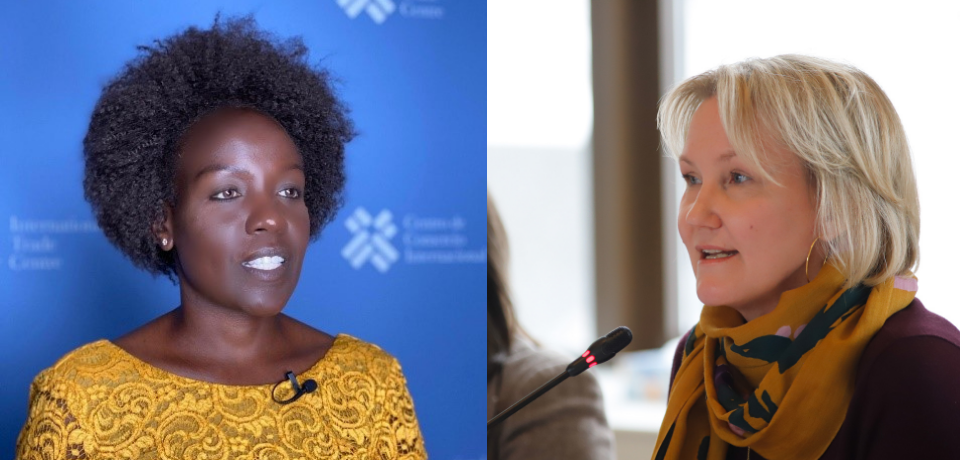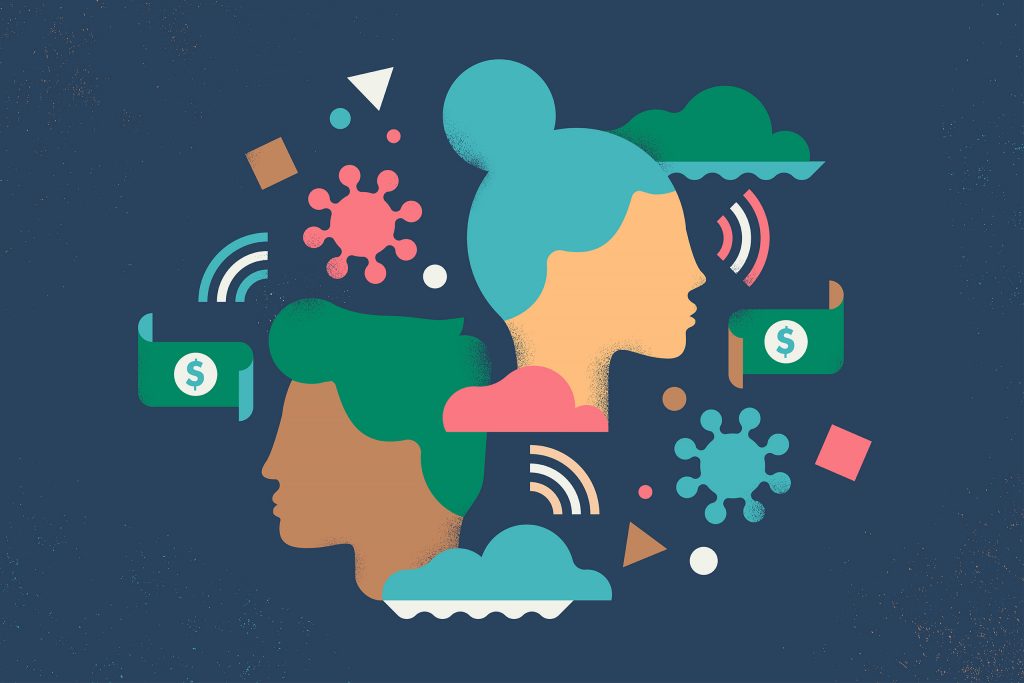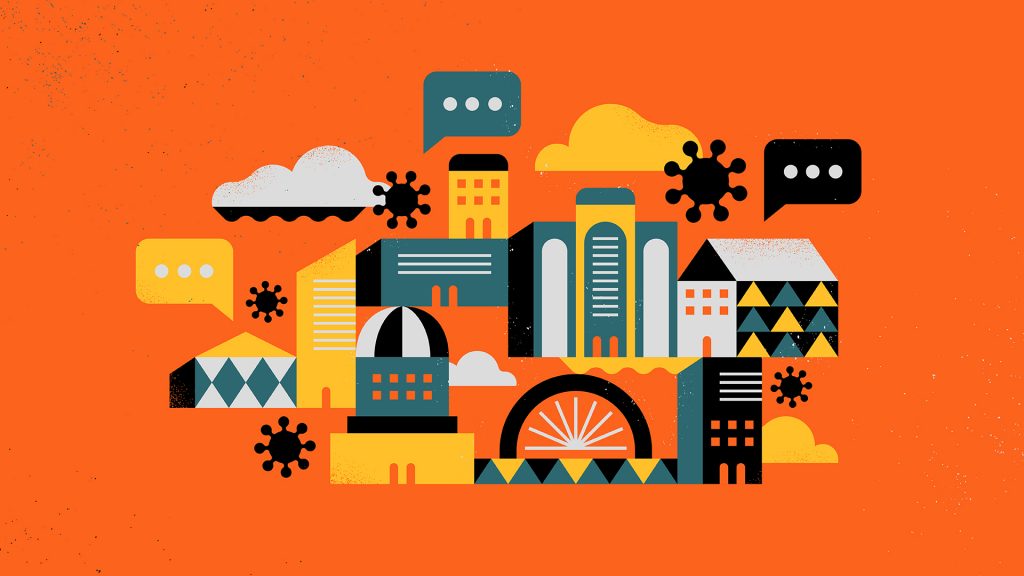Author: Catalina Fernández Carter
BiographyCatalina Fernández Carter
Catalina Fernández Carter obtained her Law Degree from Universidad de Chile, in Santiago, and has a Master’s Degree from the University of Cambridge, with a specialization in international law. Currently, she is a Lecturer of Public International Law and International Criminal Law at Universidad Adolfo Ibáñez, in Chile, and serves as a Rapporteur for Oxford University Press. Her areas of research include international human rights law, international criminal law and the law of international organizations.

Illustration by Brandon Serbec
Human rights lawyer Catalina Fernández Carter discusses how the pandemic has revealed Chile as an unequal country but how a new constitution and a stronger state response might address those inequalities.
She was interviewed by Carla Carpio, Communications Assistant at the Global Centre for Pluralism on August 20, 2020.
The following is a transcript of the interview, which has been edited for brevity and clarity.
Carla: How has COVID-19 impacted Chile?
Catalina: COVID-19 arrived in Chile a little later than most of the world. We only had our first case in March, but the virus developed quickly after that. To date, we have had more than 400,000 cases in our population of 18 million people (more than half of our 400,000 cases are in Santiago, which is where most of the population of the country lives). That makes us the country with the highest number of cases per million inhabitants in the world. We also have one of the highest mortality rates per million inhabitants.
We’re finally reducing the number of cases per day. Of course, like every country in the world, we’re concerned about a second wave, but right now the situation is a little better. We’re finally ending mandatory quarantines in several areas of the country, and, little by little, reopening businesses. But it has been tough. Some people in Santiago were in quarantine for four or five months, non-stop.
Carla: What have been the major equity and human rights issues revealed by the pandemic in Chile?
Catalina: Chile is famous for being one of the most stable countries in the region, but the truth is that it is a very unequal country. You have rich people with incomes as high as those of rich Europeans, and poor people who do not have enough money to survive to the end of the month. With that level of inequality, you have a great number of people in very vulnerable situations, which means that they cannot survive with reduced income. Even during the worst months of the pandemic, poor people had to continue working, with or without authorization, because they just needed to feed their families. Sadly, the authorities seem to be completely unaware of this situation. For instance, in May, the health secretary said that he was not aware of the level of poverty and overcrowding in certain areas of Santiago. Of all people, the health secretary of the government should have been aware of this level of vulnerability.
The virus spread more in poor neighbourhoods in Santiago, but the government has not been able to provide substantial financial support to these poorer populations. People simply did not have enough money to pay their bills or to continue feeding their families. This resulted in an important part of the population having to rely on food banks. We currently have more than 400 food banks in a country that is supposed to be one of the more successful countries in Latin America. This shows how unequal this country is. One part of the population can simply work from home and continue receiving an income. To them, the crisis has been, of course, a problem because you cannot go out or see your family or friends, but overall, you can continue quite normally. That’s not the case for a huge part of the population that simply cannot survive with reduced incomes or loss of employment and are having to rely on food banks for their daily meals, or have to expose themselves to the virus because they have continued working during this period.
Carla: How have Chile’s indigenous Mapuche communities been affected by the pandemic?
Catalina: The Mapuche communities used to live in the south of Chile, in the Araucanía region, but now a big part of the Mapuche communities also live in Santiago. Although the Araucanía region has not been one of the most affected regions in the country, there’s no specific data on whether the pandemic has impacted Mapuche communities more than other communities in that area.
All over the world, the message has been: practice social distancing, stay in your houses. However, several experts have noted that Mapuche communities have a different way of living. The idea of staying home does not make sense because they live in their society. Their way of life includes their families, but also their extended communities. Their traditions, such as ceremonies to say goodbye to those who have died, rely on the participation of the whole community. These cannot happen when the government says you cannot have gatherings with more than 10 people. The government should consider a different approach with these communities. They should realize that not all of Chile is white and shares Western values. This pandemic is showing how governments around the world have been unable to deal with indigenous communities while respecting their human rights.
Another aspect affecting Mapuche communities is that the pandemic has put Chile in a state of emergency, which grants the armed forces more power to control law and order. That is especially problematic in the Araucanía region, which has been hugely militarized in recent years. The pandemic is another excuse to send more armed forces to the region, which is creating a very complicated situation.
This is a difficult moment for Mapuche communities. On top of the pandemic, and a government that does not understand the special characteristics of their communities, they have also dealt with increasing racism in the past weeks, all due to the conflict that has existed in the region for decades and that all governments have been unable to address properly.
Carla: As Chile begins to lift restrictions and transition to a new normal, do you see any possibility for positive economic and social reforms that support those who have been hardest hit by the pandemic?
Catalina: Before the pandemic, in October of last year, we had a huge social uprising, which resulted in an agreement by the whole political spectrum to draft a new constitution. Our current constitution, drafted during the Pinochet dictatorship, does not allow the country to move forward, for instance, on social and economic rights because it puts too much emphasis on the subsidiarity of the state and privileging the role of the private sector. For several years, there have been concerns about the legitimacy of this constitution and protests to change it.
In this context, we were going to have a referendum to decide whether or not we wanted a new constitution in April, but then the pandemic hit and it was postponed to October. This will give the country a very unique opportunity to discuss what we can learn from all of this. How should we approach social, economic and cultural rights in the future? How should we address the issues of inequality that have become very clear during the pandemic? Of course, the constitution will not solve everything. You cannot solve poverty with a constitution. However, you can establish a framework in which you give more powers to the state so that it can ensure that everyone has at least a basic standard of living, a basic level of education, health care, etcetera.
If the result of the referendum is that the majority of the population does want to change the constitution, which, according to the polls, is the most likely outcome, then we will begin the process of drafting it. This may become harder in the context of the pandemic, but I think that a great part of the population is hopeful that this process will allow us to address some of the inequalities that have become very clear during these past months.
Carla: What lessons do you think Chile is taking from the pandemic?
Catalina: A big lesson that we have learned is how the most privileged and powerful people in Chile are completely unaware of how the rest of the population lives. The health authorities should not be so disconnected from the reality of the situation in different neighbourhoods. To develop effective public policy, you need to know exactly how families are living and what they actually need.
We have also learned how fragile the situation is for hundreds of thousands of families who cannot survive even one or two months without their normal income. We need to be more aware that Chile is an unequal country, and we need to address that. We cannot continue having this discourse of Chile being one of the most developed countries in South America. We started learning that lesson through the social unrest that started in October, but it is emerging even more clearly now in the pandemic.
Another lesson would be to listen to scientists from the beginning. We had an advantage with the pandemic arriving late. We should have learned lessons from Europe. Instead, the government established their own strategy of what they called dynamic quarantines, which meant certain neighbourhoods would be under quarantine but others would not, and that would change almost every week. That was severely criticized by the scientific community. Scientists were saying we need to start a full quarantine right now to stop the spread. If the government had listened, maybe we wouldn’t have had so many cases and so many deaths.
Hopefully some of these lessons will have an impact on the constitutional renewal process. Hopefully we will learn the importance of having a stronger state that can provide help to those in need.
A New Constitution for Chile
You cannot solve poverty with a constitution. However, you can establish a framework in which you give more powers to the state so that it can ensure that everyone has at least a basic standard of living, a basic level of education, health care, etcetera.
Catalina Fernández Carter, International human rights lawyer and researcher




